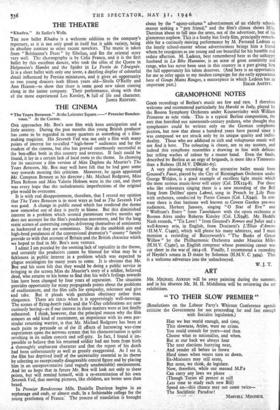THE CINEMA
I, The Years Between." At the Leicester Square.—" Premier Rendez- vous." At the Curzon.
ONE approaches Mr. Box's new film with keen anticipation and a little anxiety. During the past months this young British producer has come to be regarded in many quarters as something of a film- making magician. His Seventh Veil was not only a film with many points of interest for to-called " high-brow " audiences and for the student of the cinema, but also has proved enormously successful at the box-office both in this country and overseas. If fault could be found, it lay in a certain lack of local roots to the theme. In choosing for its successor a film version of Miss Daphne du Maurier's The Years Between, Mr. Box may well have felt that he had gone some way towards meeting this criticism. Moreover, he again appointed Mr. Compton Bennett as his director ; Mr. Michael Redgrave, Miss Flora Robson and Miss Valerie Hobson were in the cast, and there was every hope that the melodramatic imperfections of the original plot would be overcome.
It is with real disappointment, therefore, that I record my opinion that The Years Between is in most ways as bad as The Seventh Veil was good. A change in public mood which has rendered the theme now somewhat out of date is partly to blame. But this diminished interest in a problem which seemed paramount twelve months ago does not account for the film's ponderous movement, and for the long static scenes of conversing couples delivering themselves of sentiments as hackneyed as they are sententious. Nor do the snobbish airs and high-bred petulances of the conventional dramatist's " county " family provide us with that account of Britain and the British character which we hoped to find in Mr. Box's next venture. I admit I am puzzled by the seeming lack of topicality in the theme, and certainly the producers cannot be blamed for what may be a fickleness in public interest in a problem which was expected to plague sociologists for many years to come. It is obvious that Mr. Box and his team felt that they would be doing a public service in bringing to the screen Miss du Maurier's story of a soldier, believed dead, who returns to his home to find that his wife's feelings towards him have been changed by four years of separation. The situation provides opportunity for many propaganda points about the problems of readjustment, and the film calls for sympathy, tolerance and give and take. But it pleads with garrulous obstinacy rather than eloquence. There are times when it is oppressingly well-meaning. The scenes of flying-bomb raids and the V-Day celebrations are now curiously boring—as if our interest in these matters were at last finally exhausted. I think, however, that the principal reason why the film arouses an odd kind of resentment, an impatience with its own par- ticular returning warrior, is that Mr. Michael Redgrave has been at such pains to persuade us of the ill effects of harrowing war-time experiences upon the nervous system that his characterisation is quite revoking in its sullen conceit and self-pity. In fact, I found it im- possible to believe that his returned soldier had not been from birth ,a thoroughly unpleasant character and that the report of his death had been unfortunately as well as grossly exaggerated. As I see it, the film has deprived itself of the universality essential to its theme by selecting an exceptionally disagreeable central figure and by placing him in an unrepresentative (and vaguely unadmirable) environment. And let us hope that in future Mr. Box will look not only to these points, but will remind himself, with a re-examination of his own Seventh Veil, that moving pictures, like children, are better seen than beard.
In Premier Rendezvous Mlle. Danielle Darrieux begins in an orphanage and ends, or almost ends, in a fashionable college for the young gentlemen of France: The process of translation is brought
about by the " agony-column " advertisement of an elderly school- master seeking a "pen friend," and the film's climax shows Mlle. Darrieux about to fall into the arms, not of the advertiser, but of his glamorous nephew. This is a frothy but lively film, principally remark- able for a curiously moving performance by M. Fernand Ledoux as the lonely school-master whose advertisement brings him a friend whom he recognises as too young and too beautiful for his humble and sedate affection. M. Ledoux, best remembered here as the unhappy husband in La Bite Humaine, is an actor of great sensitivity and range, who has never been seen in this country in a part giving him the full opportunity his talent deserves. (And here is an opportunity for me to refer again to my modest campaign for the early appearance here of Goupi Mains Rouges, a masterpiece in which Ledoux has an






























 Previous page
Previous page